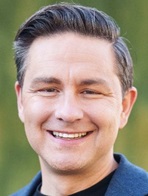Pierre Poilievre – A Conservative Leader of Canada

Pierre Poilievre, is a prominent Canadian politician and the current leader of the Conservative Party of Canada. Known for his sharp rhetoric, populist appeal, and unwavering commitment to small government principles, Poilievre has emerged as a central figure in Canada's political landscape, especially among voters frustrated by the rising cost of living and growing dissatisfaction with traditional institutions.
Born on June 3, 1979, in Calgary, Alberta, Poilievre was adopted at birth and raised in a bilingual household. He attended the University of Calgary, where he studied international relations and political science. Even as a student, he displayed a strong interest in public policy, aligning early with libertarian and conservative ideals. His political career began in earnest when he worked for Stockwell Day, a Reform Party MP and later a Cabinet minister in Stephen Harper’s government.
Poilievre burst onto the federal stage in 2004 when he was elected to the House of Commons at just 25 years old, representing the Ottawa-area riding of Nepean–Carleton. His victory made him one of the youngest Members of Parliament at the time. Over the following years, he quickly built a reputation as a combative and articulate voice on the Conservative benches.
During the Harper government, Poilievre served in various roles, most notably as Minister of Employment and Social Development and Minister for Democratic Reform. In these capacities, he championed policies focused on reducing taxes, tightening government spending, and promoting individual freedoms. Even out of government, he remained one of the party's most recognizable and active MPs, often using social media to connect directly with voters and challenge the governing Liberals.
In 2022, Poilievre officially launched his campaign for the Conservative leadership, riding a wave of public frustration over inflation, housing affordability, and government mandates. His campaign was marked by its anti-elitist tone and calls for “common sense” solutions. He attracted massive crowds across the country, especially among younger and working-class Canadians looking for change. He won the leadership decisively, capturing a majority of the vote on the first ballot.
Poilievre’s political philosophy is rooted in economic freedom. He frequently speaks out against what he describes as government overreach, central bank mismanagement, and “gatekeepers” who, he argues, stifle innovation and opportunity. He has promised to make housing more affordable by removing red tape, to fight inflation by reducing government spending, and to restore trust in Canada's institutions by increasing transparency and accountability.
Despite his popularity within Conservative circles, Poilievre has faced criticism for his confrontational style and has often been compared to populist figures such as former U.S. President Donald Trump. His opponents argue that his rhetoric can be divisive, though Poilievre has recently worked to moderate his image, positioning himself as a responsible alternative to the current government. He now emphasizes unity, economic resilience, and a Canada-first approach in international relations.
As of 2025, Poilievre stands as a key contender for the office of Prime Minister. With a strong base of support and a message focused on economic reform and personal freedom, he continues to energize Conservative voters and challenge the political establishment.
Source : Click Here

|